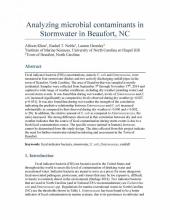
Abstract
Fecal indicator bacteria (FIB) concentrations, namely E. coli and Enterococcus, were measured in four stormwater ditches and two actively discharging outfall pipes in the town of Beaufort, North Carolina. The area of Beaufort that was sampled is mostly residential. Samples were collected from September 5th through November 17th, 2014 and captured a wide range of weather conditions, including dry weather (standing water) and several storm events. It was found that during wet weather, levels of Enterococcus and E. coli increased significantly as compared to levels observed during dry weather (p=0.027, p=0.031). It was also found that during wet weather the strength of the correlation, indicating the predictive relationship between Enterococcus and E. coli increased substantially as compared to that observed during dry weather (r=0.000 and r=0.802, n=28). In addition, the relative amount of E. coli as compared to Enterococcus (i.e. the ratio) increased. The strong difference observed in this correlation between dry and wet weather indicates that the source of fecal contamination during storm events is due to a fresh fecal contamination source. The specific source (animal or human), however, cannot be determined from this study design. The data collected from this project indicate the need for further stormwater-related monitoring and assessment in the Town of Beaufort.
About this Resource
This is a Senior Honors Thesis written by Allison Kline, an advisee of Rachel Noble, in partial fulfillment of the requirements for an undergraduate degree from the University of North Carolina at Chapel Hill. This study was conducted as part of a 2016 - 2020 collaborative research project, which involved a partnership with the North Carolina National Estuarine Research Reserve.
Kline, Allison., 2019. Analyzing Microbial Contaminants in Stormwater in Beaufort, NC Honors thesis, University of North Carolina-Chapel Hill. Available at: https://doi.org/10.17615/rwdp-mv16